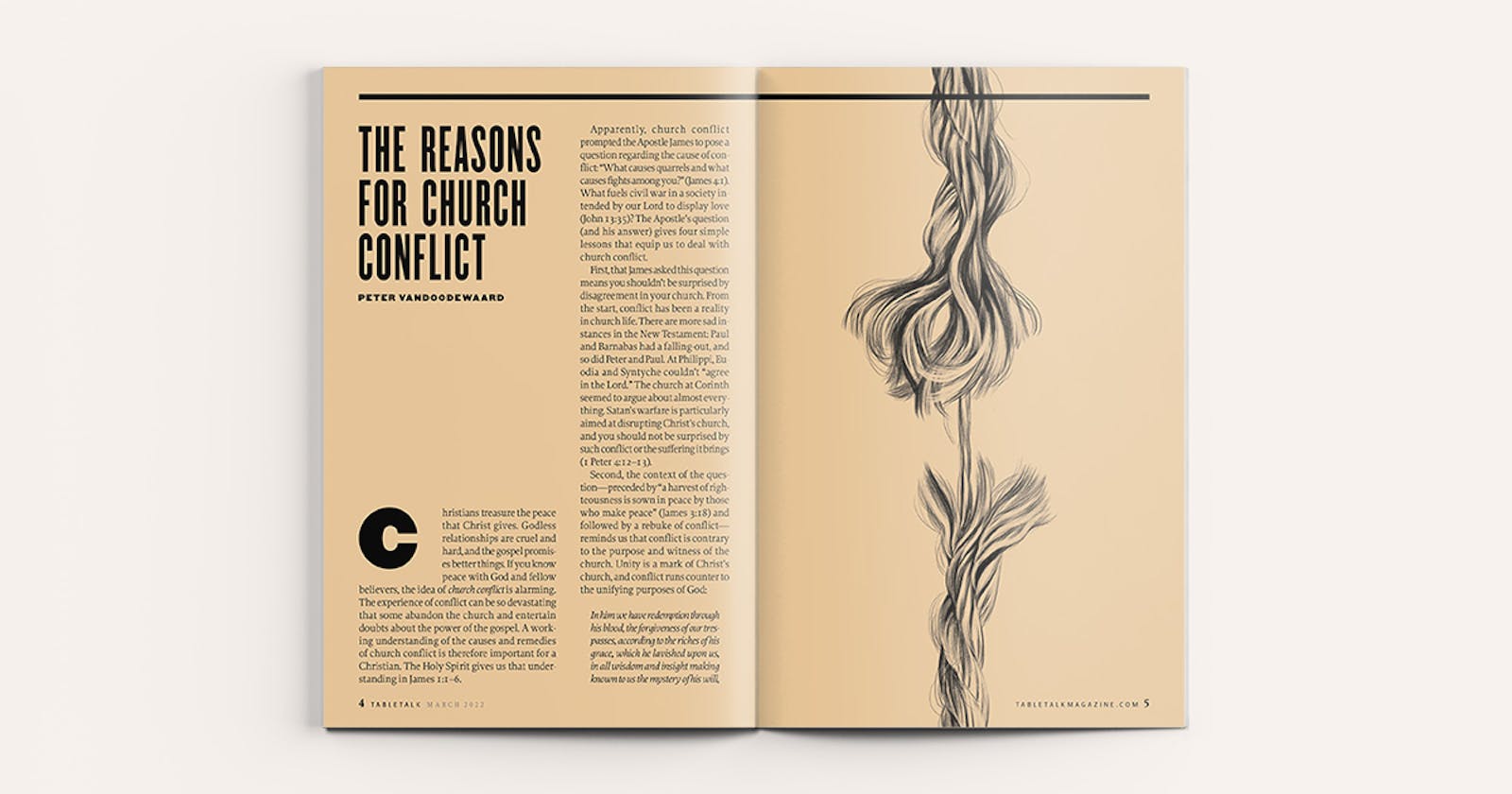
Request your free, three-month trial to Tabletalk magazine. You’ll receive the print issue monthly and gain immediate digital access to decades of archives. This trial is risk-free. No credit card required.
Try Tabletalk NowAlready receive Tabletalk magazine every month?
Verify your email address to gain unlimited access.
Christians treasure the peace that Christ gives. Godless relationships are cruel and hard, and the gospel promises better things. If you know peace with God and fellow believers, the idea of church conflict is alarming. The experience of conflict can be so devastating that some abandon the church and entertain doubts about the power of the gospel. A working understanding of the causes and remedies of church conflict is therefore important for a Christian. The Holy Spirit gives us that understanding in James 1:1–6.
Apparently, church conflict prompted the Apostle James to pose a question regarding the cause of conflict: “What causes quarrels and what causes fights among you?” (James 4:1). What fuels civil war in a society intended by our Lord to display love (John 13:35)? The Apostle’s question (and his answer) gives four simple lessons that equip us to deal with church conflict.
First, that James asked this question means you shouldn’t be surprised by disagreement in your church. From the start, conflict has been a reality in church life. There are more sad instances in the New Testament: Paul and Barnabas had a falling-out, and so did Peter and Paul. At Philippi, Euodia and Syntyche couldn’t “agree in the Lord.” The church at Corinth seemed to argue about almost everything. Satan’s warfare is particularly aimed at disrupting Christ’s church, and you should not be surprised by such conflict or the suffering it brings (1 Peter 4:12–13).
Second, the context of the question—preceded by “a harvest of righteousness is sown in peace by those who make peace” (James 3:18) and followed by a rebuke of conflict—reminds us that conflict is contrary to the purpose and witness of the church. Unity is a mark of Christ’s church, and conflict runs counter to the unifying purposes of God:
In him we have redemption through his blood, the forgiveness of our trespasses, according to the riches of his grace, which he lavished upon us, in all wisdom and insight making known to us the mystery of his will, according to his purpose, which he set forth in Christ as a plan for the fullness of time, to unite all things in him, things in heaven and things on earth. (Eph. 1:7–10)
Jesus prayed for such unity just before the cross:
“I do not ask for these only, but also for those who will believe in me through their word, that they may all be one, just as you, Father, are in me, and I in you, that they also may be in us, so that the world may believe that you have sent me. The glory that you have given me I have given to them, that they may be one even as we are one, I in them and you in me, that they may become perfectly one, so that the world may know that you sent me and loved them even as you loved me.” (John 17:20–23)
Third, the Apostle identifies the source of conflict as “desires for pleasure that war in your members” (James 4:1b, NKJV). This refers to the reality of indwelling sin—the true Christian still has powerful selfish pleasure-seeking desires. James describes this in graphic terms: “You desire and do not have, so you murder. You covet and cannot obtain, so you fight and quarrel. You do not have, because you do not ask. You ask and do not receive, because you ask wrongly, to spend it on your passions” (vv. 2–3).

This is profoundly humbling: conflict brings existing sinful desires and worldly ways of thinking and acting to the surface. James warns that these corrupt your prayers (“you ask and do not receive, because you ask wrongly”) and shift your goals from the glory of God and the good of your neighbor to worldly pleasure and influence (“friendship with the world”). Such passions fuel the fires of conflict and place you in opposition to God Himself, for “friendship with the world is enmity with God.” These are acts of covenant betrayal—James calls this spiritual adultery: “You adulterous people! Do you not know that friendship with the world is enmity with God? Therefore whoever wishes to be a friend of the world makes himself an enemy of God” (v. 4).
That conflict finds its source in our sinful desires and worldly thinking points out a solution. The path to peace begins with asking ourselves hard questions. Why are my passions so heated? Am I keeping in step with the Spirit, or am I self-willed? Am I praying that God would show me the plank in my own eye before I deal with my brother’s speck (Matt. 7:3)? Am I willing to cover sins with love? We should evaluate our own roles in and response to disunity—consider your heart (Mark 7:20–23). Pray that God would use conflict to reveal sin and purify His church.
There is a final lesson: church conflict is an occasion to renew our dependence on the grace of God. This particular conflict in the early church was the occasion for the Holy Spirit to enlarge the church’s understanding of grace. James concludes with this simple statement: “He gives more grace” (James 4:6).
Perhaps you’ve thought of grace as a one-time deposit—something you needed at the beginning of your Christian life. But grace is more: it is the enduring power of God that brought you to life in Christ, keeps you in that life, and carries you home. He gives more grace because Christians so obviously and desperately need more grace—to see our sins, to confess our sins, and to live to God. As James says: “Submit yourselves therefore to God. Resist the devil, and he will flee from you. Draw near to God, and he will draw near to you” (vv. 7–8).
If we respond biblically to church conflict, we won’t be embittered or proud, even if it doesn’t appear to shake out well for us. Instead, we will come to understand that He is working on our hearts, with the generous intention of giving us more enabling grace, to equip ourselves to promote the good of His church. So trust Him, even on the hardest days. He intends to give more grace.
